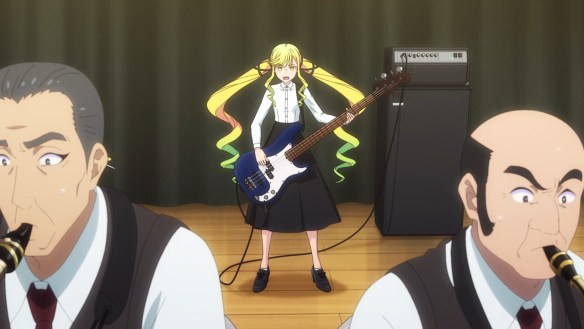Hello folks, and welcome back to Wrong Every Time. Today I’m eager to check in on Lilisa and Otoha, our two fledgling rockers who now stand on the brink of their first public performance. That said, they’re not technically performing as a rock duo; hoping to test the waters as they seek like-minded bandmates, they’ve instead volunteered to fill in for a larger symphonic group, playing the bass and drums to accompany a congenial group of musicians whose group motto is “have fun together.”
This will, of course, be a total disaster. Otoha is not interested in “having fun together;” she is a ruthless maniac who seeks only to dominate her fellow players, and has already proven herself the most selfish drummer this side of Whiplash. For Otoha, rock seems to mean “indulgence” – indulgence in vulgarity, indulgence in ferocity, and indulgence in a total abandonment of the harmony-enforcing restrictions of high-class ladyship.
Otoha has fully internalized the compartmentalization Lilisa is still struggling to achieve, but the self-absorbed nature of her rebellion seems to leave little room for solidarity, community, or true reinvention – things that, while admittedly not “hardcore” in the same way as a sick drum fill, are just as essential to the philosophy of rock and roll. Struggling to pay for gas while sleeping in a van, drifting from friends and family as they gravitate towards socially proscribed careers, challenging an increasingly uncertain future with the flimsy saber of “artistic fulfillment” – such a tenuous life can only be made tolerable through embracing music as a community unto itself, through becoming a conduit of shared humanity expressed in glorious, deeply personal sound. Is there room in Otoha’s heart for such a selfless ideal, or does that raised middle finger stand as the beginning and end of her philosophy? Let’s find out!
Episode 5
We cut back in to Red Familia’s rehearsal, where Lilisa is marveling at how slowly they’re playing the piece, and how poorly they’re executing it even in spite of that. One frequent appeal of rock music is how easy it is to pick up an instrument and play – if you can shape your hand into a power chord, you can already play and even construct simple rock songs. Lilisa clearly doesn’t have that issue or that motivation; her critiques of the overall band demonstrate a strong fluency in musical form, and a desire to express that mastery on-stage
I suppose that’s one big point of division between myself and this show’s stars; though I obviously respect technically skilled musicians, technique for me was only ever important in terms of what new sounds it might facilitate, not how it reflected my dedication, practice, and ultimate mastery. More difficult parts aren’t inherently more interesting to me; I have none of that competitive urge to demonstrate how good I am at the instrument itself. In contrast, Lilisa and Otoha have done little else but attempt to prove to each other their superior physical technique
“After all, our motto is ‘have fun together.’” They’re framing this motto as a crutch or an excuse, which I suppose from our leads’ perspective makes sense. To them, music is a battlefield, not a gentle collaboration
Lilisa laments that slowing the song down further “kills any chance of expression.” If you sufficiently divorce a song from its intended tempo, it really changes the tone and emotional impact. This can be used for compelling transformative effect, but can also just change any song into a funeral dirge, where flourishes from the players stand out because they’re so isolated in time
A flashy-ass dude in a crimson suit and gold tie pops up; apparently he’s Ishitani, an associate of the band director
Jun Ishitani, a pro singer and the third act at their show
“Must be nice to play in a band. It’s so easy to make it seem like you know what you’re doing.” Framing collaborative musicianship as inherently “cowardly,” because you can “hide” within the overall composition. A very selfish perspective on an inherently communal activity, but one that certainly resonates with the selfish styles our leads have presented
“Songs without vocals are nothing more than background music in the end.” Damn, that sure is a ludicrous stance to take! In his rush to become a strawman antagonist, Ishitani has disparaged pretty much the entire history of music
Still, his jabs resonate with Lilisa’s anxieties; in modern times, fully instrumental bands do indeed have to overcome the inherent bias against groups with no vocalist. A flash of her old bird cage, now ornamented with Otoha’s rose thorns
Thus she’s fired up into a competitive spirit. Funny how Lilisa doesn’t really play rock music for her own sake; throughout the series, she’s mostly been provoked into playing through the need to shove it in someone else’s face. Reminds me of the Always Sunny play episode, where the gang was confused by the idea of just creating a play for its own sake, rather than to get back at or scam someone
Excellent Go Nagai-ass expression as Lilisa commits to ruining Ishitani’s whole career
And of course, Alice is outside, soon to discover her sister’s true nature
Her fanged friend Hiyori knows one of the performers
Alice clearly uses lordly propriety as a shield against vulnerable intimacy, making her weak to an entreaty like Hiyori asking her “best friend” to accompany her. Alice’s poise is brittle; there’s no core of self-confidence behind it, just the desperate fear of losing her father if she takes one wrong step
The audience contains like fifteen people total, several of whom are children who don’t seem to be paying attention. So much for Ishitani’s glamorous pro singing career
“It seems the music of the lower class is truly nothing to write home about.” Oh my god Alice
She is thrilled upon seeing Lilisa, eager to tell her father about this betrayal of high-class behavior
Lilisa starts the group off at a much faster tempo than practice, with Otoha following. Given they both open the song and compose most of the rhythm section, the rest of the band has no choice but to follow along
This trick basically only works because as musicians and performers, our own tolerance for errors in our play is generally much lower than the audience, which frequently won’t notice anything went wrong. Sure, if you’re being judged for a competition it’s a problem, but flubbing a note or two when playing to a quarter-filled auditorium? With the rhythm section in utter lockdown, the song will seem more or less coherent even if individual horn or woodwind players have to take a moment to collect themselves from time to time. And at a certain point, playing faster with imperfect accuracy is much more compelling than playing down to the tempo where you can avoid any mistakes
The band is whipped up into their spirit as well, thrilling at the intensity of going all-out, mistakes be damned. This is something universal; regardless of your approach to music, being caught in the full grip of giving everything you have to the sound is a marvelous, transcendent experience. It essentially feels like an act of worship, committing yourself to something beyond you, embracing the transformative, unifying power of art to reach a mutual understanding deeper than words alone can penetrate
Eventually Lilisa just can’t accept playing accompaniment anymore, and grabs her guitar to wail out a solo. Excellent work with the recording here; they’re convincingly building from an initially halting symphonic band into a powerful compliment to Lilisa’s lead solos
“This can’t be the same girl I know who just does everything her mother says, right?” Rather than the musicianship itself, it is Lilisa’s embodiment of independence that dazzles Alice. Appropriate for our themes here
The production’s doing its best with this full band performance; most of the “momentum” is provided by spinning cuts around our two CG figures, but there’s enough minor cuts of movement across the rest of the band to make it seem like everyone’s participating. Unless you’re Kyoto Animation, there’s really no way to pull off a full orchestral performance without engaging in some serious animation trickery
Ishitani compliments his old classmate on the great performance. So a bit of a cad, yes, but nonetheless most fundamentally dedicated to creating great music. I suppose that’s an obvious, natural concession for this series – you run into a lot of big egos in music, and often must rely on mutual dedication to the music itself to overcome personal animosities
Speaking of “big egos,” Ishitani’s offer to recruit our leads as his backup band leads into another insult barrage from Lilisa. To be honest, their rants really emphasize the juvenile nature of their commitment; sure, rock is about authenticity, but you can be sincerely committed to the music and its message without being an easily-provoked dick. I can’t really agree with how this author is conflating sincere self-expression and just plain antisocial aggression
I suppose it still remains to be seen whether our mangaka Hiroshi Fukuda sees the limitations of this gimmick, but it feels like an unfulfilling interpretation of rock’s call for uninhibited self-expression. Really hoping their dedication to authenticity is eventually turned in a more productive direction
Ultimately, Alice is thrilled to be let in on Lilisa’s private self. The sincerity of her performance forged a genuine connection between them, something even less socially mediated than her relationship with her father
And inspired by her sister’s example, she’s able to admit how happy she was that Hiyori invited her
Lilisa’s mom gets extremely creepy when Alice enquires about Lilisa’s past, saying that there “was no ‘before’ time.” What is she even getting out of this life, if it requires abandoning not just her own history, but pretty much her entire relationship with her daughter? Also hoping we get some insight into her situation eventually
And Done
Thus our pair survive their first live performance, and even induct Alice into their conspiracy in the process! Though frankly, it didn’t actually take too much work to convince Alice to embrace the Rocker’s Ethos; her life before this was one of fragile self-regard and immense loneliness, a thin veneer of noble elegance papering over a paucity of genuine intimacy. All of this leaves me intensely curious about what Alice’s father is like – is he actually emotionally available to his daughter, and if so, why did he choose to marry someone so lacking in human sentiment as Lilisa’s mother? As these characters reach their breaking point regarding passive coexistence, I’m hoping we’ll see the passions behind the archetypes, the lives that led them to this odd performance of domestic happiness. But in the meantime, I’m guessing it’s time to recruit some goddamn bandmates!
This article was made possible by reader support. Thank you all for all that you do.




